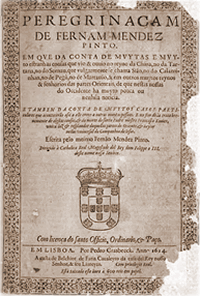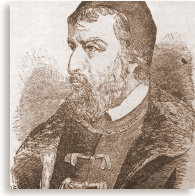
Peregrinaçam de Fernam Mendez Pinto — © Biblioteca Nacional Digital.
|
Liar,
Liar.
Mendes Pinto's
Peregrinaçao
Illuminates Portugal's
Empire in Asia.
Dr. Ronald Fritze
God gave the Portuguese a small country as cradle
but all the world as their grave.
Antonio Vieira
Unlike many of his countrymen in the sixteenth century, Fernão Mendes Pinto (1510?-1583) did not make the world his grave. Although he spent the years from 1537 to 1558 in Asia and had many close calls with death, Mendes Pinto made it back home alive. There he settled down on a small estate near Lisbon, married, and wrote an account of his years in the Far East.
As was typical for most of the people involved in the European overseas expansion of the sixteenth century, Pinto failed to strike it rich. He did, however, leave an account of his overseas adventures (as did Bernal Diaz, a comrade-in-arms of Hernan Cortes in the conquest of Mexico). Mendes Pinto wrote his book between 1569 and 1578, but it was not published until 1614 when it appeared as Peregrinaçao [Travels].
Better a Sailor than a Soldier.
Pinto sailed from Lisbon for India in March 1537 and arrived at Diu in September of the same year. It was an uneventful voyage. His goal was to serve as a soldier, but he found it to be too dangerous. In 1539 he took employment with Pero de Faria, the governor of Malacca. For the next several years he participated in the trade around the East Indies, Indochina, and coastal China.
In 1542 or 1543 he sailed with several other Portuguese on the junk of a Chinese pirate and landed at Tanegashima on Japan. If this claim is true, Pinto was in the first group of Europeans to reach Japan. He would make three more trips to Japan in 1549, 1551, and 1554-56.
During his second voyage to Japan, Pinto convinced St. Francis Xavier to accompany him. The missionary field was ripe for harvest (and so, we shall see, was Pinto). When Pinto departed from Japan in the course of his third visit, St. Francis Xavier accompanied him again. In 1554 Pinto was in Goa preparing to return to Portugal when he experienced a conversion experience and joined the Jesuit Order as a lay brother. He also gave them a substantial portion of his accumulated wealth.
Pension Denied, He Raises a Family.
By 1557, Pinto changed his mind about the religious life and left the order, but remained on good terms with the Society of Jesus. He returned to Portugal in 1558 and hoped to be granted a pension or sinecure for all his work for the Portuguese crown in Asia. After waiting for recognition for four years, Pinto left Lisbon. He moved to Almada across the Tagus and married Maria Correia de Brito. Together they raised a family.
Pinto's career in Asia was fraught with dangers and adventures. As he described it in the Peregrinaçao,
|
With God's will I arrived safely in the city of Lisbon on the twenty-second of September in the year 1558 at the time that the queen, our lady Dona Catarina - may she rest in peace - was governing this kingdom. I gave her the letter I was carrying from the governor of India and an oral report of everything I thought would redound to my credit. She sent me to the official then in charge of these matters who, with fine words and finer hopes - which I fully believed at the time because of what he said to me - held on to those poor papers for four and a half year. At the end of that time, the only harvest I reaped was the hardship and grief I suffered in presenting my petition, which I dare say was far worse than all that I had suffered throughout the previous years.
. . . . . . . . . . . . . . . . . . . . . . . . . . . . . . . . . . . . . . . . . . . . . . . . . . . . . . . . . .
And this was what came of my services of twenty-one years, during which I was captured thirteen times and sold into slavery sixteen times, as a result of the unfortunate series of events that took place in the course of this long peregrination of mine which I have narrated above at great length.
|
It's a Wonder, but He Made It!
Captured thirteen times and sold into slavery sixteen times - and that interspersed with shipwrecks, storms, battles, sieges, and incarcerations in dungeons! No wonder Asia was considered a graveyard for the Portuguese. The wonder is that Pinto made it home safely.
When Pinto's Peregrinaçao was published in 1614, it proved to be very popular. Besides multiple editions in Portuguese, it was translated into Spanish, French, German, Dutch, and English. None of the translations were particularly accurate and many of the translations were also severe abridgements of Pinto's work.
During the seventeenth century, Pinto's book was as popular as Cervantes' Don Quixote, but it did not have equal staying power. Furthermore, like many writers of travels, Pinto acquired the reputation of being a liar. That canard put him in the good company of Marco Polo and Ibn Battuta. Like those two illustrious travelers, Pinto benefits from subsequent research, which confirms his descriptions as accurate. He was (for the most part) telling the truth about what he saw.
Ethiopia, Red Sea, Great Wall.
That is not to say that Pinto was not doing a little inventing. There seems to be no evidence  that he traveled into the interior of Ethiopia or that he was captured in the Red Sea toward the beginning of his career in the East. It is also unlikely that he traveled overland in China from the Great Wall down to Indochina and over to Canton. He also may not have been in the first party of Portuguese to visit Japan, but he certainly followed soon after them, if he was not among the first. that he traveled into the interior of Ethiopia or that he was captured in the Red Sea toward the beginning of his career in the East. It is also unlikely that he traveled overland in China from the Great Wall down to Indochina and over to Canton. He also may not have been in the first party of Portuguese to visit Japan, but he certainly followed soon after them, if he was not among the first.
The fact is, Pinto was not writing a straightforward memoir of his travels in the East. He was also writing a satire of Portuguese society and its overseas empire. As a narrator, he frequently supplies critical comments made by various Asians about the greed, brutality, and hypocrisy of the Portuguese. He shows how the missionary efforts of the Portuguese were undermined by their own bad behavior.
On the other hand, the society of China and several other Asian states are described in utopian terms and compared to Portuguese society. Portugal was shown to be lacking. Whereas China was a just and wealthy land, Portugal was a poor and corrupt land. In sixteenth century Portugal such an attitude could get an author in a lot of trouble, some of it from the dreaded Inquisition.
Trader, Pirate, Missionary.
At the same time, the Peregrinaçao is not a novel like Don Quixote. It remains a document that is an important source for the history of the Portuguese empire in Asia and the political history of certain areas such as Burma and parts of Japan. Its descriptions also tell us much about the trading world of the Indian Ocean and the Far East, the dangers of piracy, and the missionary enterprise.
Anyone interested in reading Pinto, however, should use the modern translation of Rebecca D. Catz, which was published in 1989.
A large section of the Peregrinaçao is available in Portuguese Voyages 1498-1663, edited by C. D. Ley, but the selections are based on the very unsatisfactory translation of Henry Cogan from 1653. Cogan's work, written in seventeenth century English, was itself based on the defective Spanish translation and omits the extensive materials about St. Francis Xavier's missionary work.
PLANET CLIO is ruled by Dr. Ronald Fritze,
Professor of History at the University of Central Arkansas.
An independent entity in the CornDancer consortium of planets,
Planet Clio is dedicated to the study and exploration of history.
CORNDANCER
is a privately owned, non-commercial developmental website
for the mind and spirit
maintained by webmistress Freddie A. Bowles of the Planet Earth.
Submissions are invited.
|

